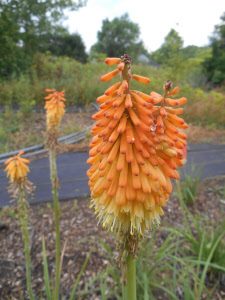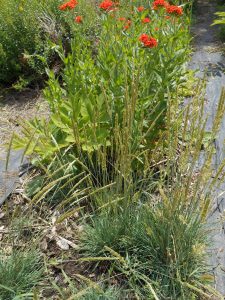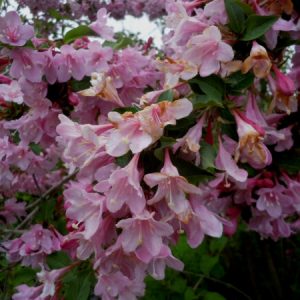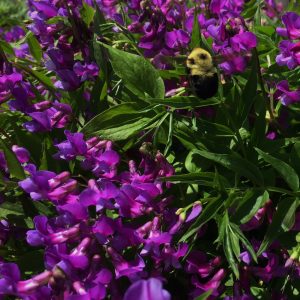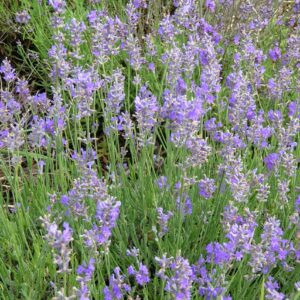Shop
Showing 449–456 of 788 results
-
Kniphofia uvaria Red hot poker, Torch lily Z 5-10
Vibrant red and yellow spikes of tube-shaped flowers
ARCHIVED
Note: This is a plant not currently for sale. This is an archive page preserved for informational use.
Vibrant red and yellow spikes of tube-shaped flowers in early summer arise on leafless stems (called a scape) from a basal clump of strap-like leaves
Size: 2-3’ x 12-15”
Care: sun in moist well-drained to well-drained soil
Native: South Africa
Wildlife Value: deer & rabbit resistant, attracts hummingbirdsIntroduced to English gardens c. 1700 and called Alöe uvaria then renamed by English botanist Wm. Jackson Hooker. The Gardeners Dictionary (1783): “The flowers are produced in close thick spikes, upon stalks near three feet high, They are of an Orange colour…” Illustrated in Curtis’ Botanical Garden 80 (1 Nov 1854).
-
Koeleria glauca Blue hair grass Z 5-9
Erect spike-like panicles June thru August
ARCHIVED
Note: This is a plant not currently for sale. This is an archive page preserved for informational use.
Erect spike-like panicles June thru August, poke above a neat mound of erect, blue grass blades.
Size: 16" x 12”
Care: Sun in well-drained soil
Native: Siberia & Central EuropeCollected before 1800.
-
Koeleria macrantha syn. Koeleria cristata June grass
whitish spike-like panicles
Erect ivory spike-like panicles June thru August, poke above a neat mound of erect grass blades.
Size: 2' x 18"
Care: Sun in well drained to moist well-drained soil
Native: prairies of No. America, Wisconsin native.Koeleria named by Linnaeus for grass specialist and professor at Mainz, G.L. Koeler (1765-1806). Cheyenne Indians tied June grass to the heads of Sun Dancers to deter them from getting tired and made paint brushes from it. New Mexico’s Jemez Indians made brooms from tied blades. Isleta and Havasupai Indians ate ground seeds in bread and as mush. Liberty Hyde Bailey (1933) said: “Sometimes cultivated for lawn decoration in open dry ground.” Meriwether Lewis collected this at Camp Chopunnish in Idaho on June 10, 1806 while waiting for snow melt to safely cross the Bitterroots on the expedition’s way home.
-
Kolkwitzia amabilis syn Linnaea amabilis Beautybush Z. 5-9 SHRUB
Profuse pale to dark pink bell flowers with yellow throats grace this arching shrub in early summer
Profuse pale to dark pink bell flowers with yellow throats grace this arching shrub in early summer
Size: 10’ x 12’
Care: Full sun in well-drained soil. Flowers on last season’s wood so prune just after blooms fade.
Native: China
Wildlife Value: attracts butterflies, and beesNamed for Richard Kolkwitz, (1873-19560 botany professor in Berlin. First introduced to the West by Ernest Henry “Chinese” Wilson who found it in the mountains near Ichang and sent its seeds to the Veitch Nursery in England in 1901. Harvard’s Arnold Arboretum received the shrub in 1907. It was one of Wilson’s favorite plants out of his hundreds of finds. Wilson wrote, “(a)mong the deciduous-leaved shrubs that central and western China has given to American gardens Kolkwitzia stands in the front rank.” Arnoldia 68/2.
**LISTED AS OUT OF STOCK BECAUSE WE DO NOT SHIP THIS ITEM. IT IS AVAILABLE FOR PURCHASE AT OUR RETAIL LOCATION.
-
Lathyrus japonicus v. maritimus Beach pea Z 3-6
Magenta pea flowers June through August on its trailing stems. A legume, it puts nitrogen in the soil fertilizing plants growing nearby.
ARCHIVED
Note: This is a plant not currently for sale. This is an archive page preserved for informational use.
Magenta pea flowers June through August on its trailing stems. A legume, it puts nitrogen in the soil fertilizing plants growing nearby.
Size: 18-24” tall but lays on ground, not upright
Care: sun in well-drained soil. Drought tolerant.
Native: all northern states from the Atlantic to the Pacific, Wisconsin native. (It seems strange that a variety of a plant native to Japan grows as a native in North America. The species, although named “Japonica” is circumpolar, native in the entire northern hemisphere.)
Wildlife Value: pollinated by bees, primarily bumblebeesIroquois cooked the stalks and leaves to remedy rheumatism. Taxonomic mess. First described and named in 1735 then another name in 1824, now changed again to its current name.
-
Lathyrus vernus Spring vetchling, Spring pea, Spring vetch Z 4-9
Bushy plants bear showy, red-purple pea-like blooms age to rich purple in March-June. Spring gem.
OUT OF STOCK
Bushy plants bear showy, red-purple pea-like blooms age to rich purple in March-June. Spring gem.
Size: 10” x 10”
Care: sun in north to shade in south, moist well-drained soil. Drought tolerant once established
Native: No. Europe - Siberia
Awards: Royal Horticultural Society Award of Garden Merit, Elisabeth Carey Miller Botanical Garden Great Plant PicksIntroduced to gardens before 1629 when herbalist John Parkinson (1567-1650) called it “Blew Everlasting Pease.”
-
Lavandula angustifolia ‘Munstead’ Z 5-9
Very fragrant, compact form of Lavender blooms in wands July-September.
Very fragrant, compact form of Lavender blooms in wands July-September.
Size: 12-18” x 12-18”
Care: Sun, well-drained, soil. Prune to 8” in spring every 2 years to control plant size and promote new growth.
Native: species native to Western Mediterranean
Wildlife Value: Attracts many different bee species and butterflies. Resistant to rabbits and deerThis selection introduced to gardens in 1916. Named for Munstead Woods in England, the home of the extraordinary garden designer Gertrude Jekyll (1843-1932) Lavandula is Latin from lavare meaning “to wash” because it was thrown into baths for the scent, “or because used in lye to give a fragrancy to linen; and because it is very good to wash the face with, and give it both beauty and a grateful scent.”
-
Lavandula angustifolia Lavender Z 5-9
June and rebloom in late summer, lavender spikes, fragrant
ARCHIVED
Note: This is a plant not currently for sale. This is an archive page preserved for informational use.
June and rebloom in late summer, lavender spikes, fragrant
Size: 2’ x 2’
Care: Sun, well drained moderately fertile soil
Native: Western Mediterranean
Wildlife Value: attracts butterfliesName is Latin from “lavare” meaning to wash because Romans used lavender to scent their baths. Ancient Phoenicians used lavender to make perfume. Cultivated in Islamic gardens by 1050 A.D. Queen Elizabeth, I ate lavender conserve, made by adding sugar to the flowers while Charles VI of France stuffed pillows with lavender and sat on them. Culpepper, 16th century English herbalist, wrote that lavender grew in almost every garden and cured headaches, apoplexy, dropsy, fainting, toothaches, and “passions of the heart.” Jefferson grew it with herbs at his farm, 1794.

